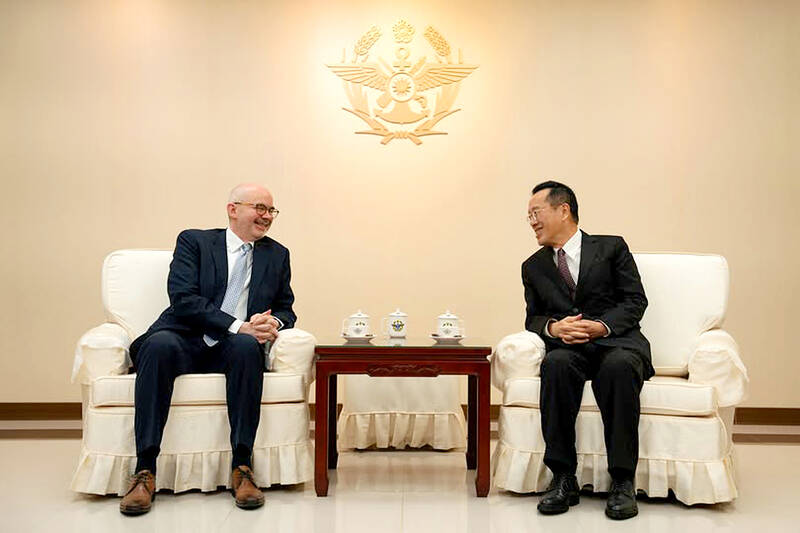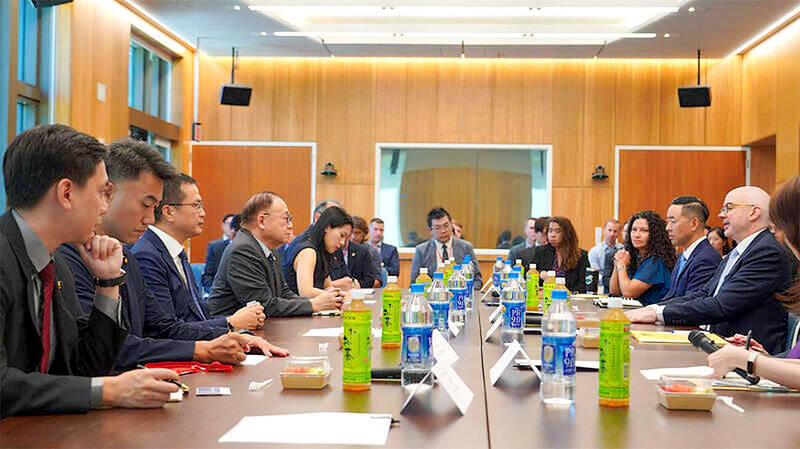American Institute in Taiwan (AIT) Director Raymond Greene has met with Minister of National Defense Wellington Koo (顧立雄) as well as opposition lawmakers to discuss Taiwan-US defense cooperation, the AIT said on Monday.
Greene last week met with Koo to discuss US efforts to bolster Taiwan’s defensive capabilities to fulfill Washington’s responsibilities under the Taiwan Relations Act, the institute, the US’ de facto embassy in Taiwan, wrote on Facebook.
“We also discussed further US-Taiwan cooperation in traditional and asymmetric military deterrence as well as societal resilience,” it added.

Photo: Screen grab from the American Institute in Taiwan’s Facebook page
In a separate post, the AIT said Greene met with Chinese Nationalist Party (KMT) lawmakers to talk about Taiwan-US defense cooperation.
The AIT appreciates the KMT’s “continued partnership in enhancing Taiwan’s national security and whole-of-society resilience,” it added.
KMT lawmakers Hsu Chiao-hsin (徐巧芯), Chen Yeong-kang (陳永康), Lo Chih-chiang (羅智強) and Niu Hsu-ting (牛煦庭) were among the party members who attended the meeting, according to a photograph accompanying the post.

Photo: Screen grab from the American Institute in Taiwan’s Facebook page
In response to media queries, Koo said that Taiwan-US military cooperation has always centered on maintaining regional peace and stability, and exchanges with the AIT are an integral part of that cooperation.
The Ministry of National Defense does not disclose the content of the deliberations between the minister and AIT directors as a matter of long-standing policy, he added.
Sources speaking on condition of anonymity said that the meeting between the AIT and KMT lawmakers revolved around the opposition party’s stance on the defense budget, and Taiwan-US cooperation in defense resilience initiatives, including drones and civil defense.
The meeting lasted for about 20 minutes, with the two sides agreeing to meet again later, they added.
In other news, the South China Morning Post on Sunday quoted analysts as saying that the US’ recent high-profile disclosure that more than 500 Taiwanese soldiers participate in the Northern Strike drills in Michigan was a strategic move to counter rising distrust of Washington among Taiwanese.
The US military newspaper Stars and Stripes last week revealed that Taiwan has been sending military personnel to participate in the military exercise at least since 2021, with Taiwanese attendance at an all-time high this year.
The South China Morning Post called the admission a break from the US’ long-standing policy of avoiding public discussions of Taiwan-US military exchanges that might provoke Beijing.
The Hong Kong daily quoted Taiwan International Strategic Study Society executive director Max Lo (羅慶生) as calling the revelation “significant.”
“It shows Washington wants Taiwan’s involvement to be seen, not hidden,” he said.
The article cited a German Marshall Fund report that said most public opinion polls showed that Taiwan’s “historically favorable view” of the US is declining.
Released on Monday last week and titled “Taiwan’s Growing Distrust of the United States,” the report cited US President Donald Trump’s 20 percent tariff on Taiwanese goods as “a major factor for the hit to the US image.”
Another belief shown in polls is that the Trump administration is deliberately attempting to erode Taiwan’s dominant position in the global semiconductor market, the report said.
The German Marshall Fund cited a Brookings Institution report conducted in February and April that showed that 40.5 percent of respondents said they held a negative view of the US, up from 24.2 percent in July last year.
China specialist Bonnie Glaser and coauthor Jennifer Lan said in the German Marshall Fund report that distrust of the US in Taiwan might “embolden [the People’s Republic of China] to undertake riskier actions to compel unification.”
That outlook could explain why the US was now publicizing Taiwan’s participating in Northern Strike, the South China Morning Post quoted Lo as saying.
“Revealing Taiwanese participation is intended not only as a deterrent to mainland China, but more importantly as reassurance to Taiwan’s public,” he said.
“It shows the US is training and standing alongside Taiwan, even as Trump’s tariffs and demands stir resentment,” he added.
Additional reporting by Huang Ching-ting and Lin Hsin-han

Taiwan has received more than US$70 million in royalties as of the end of last year from developing the F-16V jet as countries worldwide purchase or upgrade to this popular model, government and military officials said on Saturday. Taiwan funded the development of the F-16V jet and ended up the sole investor as other countries withdrew from the program. Now the F-16V is increasingly popular and countries must pay Taiwan a percentage in royalties when they purchase new F-16V aircraft or upgrade older F-16 models. The next five years are expected to be the peak for these royalties, with Taiwan potentially earning

STAY IN YOUR LANE: As the US and Israel attack Iran, the ministry has warned China not to overstep by including Taiwanese citizens in its evacuation orders The Ministry of Foreign Affairs (MOFA) yesterday rebuked a statement by China’s embassy in Israel that it would evacuate Taiwanese holders of Chinese travel documents from Israel amid the latter’s escalating conflict with Iran. Tensions have risen across the Middle East in the wake of US and Israeli airstrikes on Iran beginning Saturday. China subsequently issued an evacuation notice for its citizens. In a news release, the Chinese embassy in Israel said holders of “Taiwan compatriot permits (台胞證)” issued to Taiwanese nationals by Chinese authorities for travel to China — could register for evacuation to Egypt. In Taipei, the ministry yesterday said Taiwan

Taiwan is awaiting official notification from the US regarding the status of the Agreement on Reciprocal Trade (ART) after the US Supreme Court ruled US President Donald Trump's global tariffs unconstitutional. Speaking to reporters before a legislative hearing today, Premier Cho Jung-tai (卓榮泰) said that Taiwan's negotiation team remains focused on ensuring that the bilateral trade deal remains intact despite the legal challenge to Trump's tariff policy. "The US has pledged to notify its trade partners once the subsequent administrative and legal processes are finalized, and that certainly includes Taiwan," Cho said when asked about opposition parties’ doubts that the ART was

If China chose to invade Taiwan tomorrow, it would only have to sever three undersea fiber-optic cable clusters to cause a data blackout, Jason Hsu (許毓仁), a senior fellow at the Hudson Institute and former Chinese Nationalist Party (KMT) legislator, told a US security panel yesterday. In a Taiwan contingency, cable disruption would be one of the earliest preinvasion actions and the signal that escalation had begun, he said, adding that Taiwan’s current cable repair capabilities are insufficient. The US-China Economic and Security Review Commission (USCC) yesterday held a hearing on US-China Competition Under the Sea, with Hsu speaking on